- Home
- David Pilling
The Path of Sorrow Page 16
The Path of Sorrow Read online
Page 16
“The soldiers are gone, and supper will soon be ready,” Nassur said in his own tongue, treating Felipe to an exaggerated wink.
Felipe put aside his caution and joined Nassur for a meal.
9.
Hasan, the City of Eagles, drowsed in the searing glow of the mid-afternoon sun. The heat was oppressive and would remain so until the baking copper disk in the sky started to sink below the horizon. Life in the city proceeded at a sluggish, drowsy pace.
Everything happened slowly in Hasan at this time of year, even death. For fifteen days the armies of General Anma had been camped outside the walls, cutting off any traffic to and from the city. Anma was in no hurry to clinch her triumph, preferring instead to gloat over the slow strangulation of her enemy’s last stronghold.
She had chosen a high ridge overlooking Hasan to pitch her campaign tent. Here she sat, surrounded by her sycophants and general staff, spying on movements inside the city with an eye-glass and hosting parties of riotous self-congratulation. She was the Empress of Temeria now, or almost, and meant to enjoy herself.
To show she was not incapable of mercy, Anma had made the people of the city an offer. She had ordered it written on hundreds of pieces of parchment weighted down with stones, and then hurled from catapults over the walls. So far there had been little response, which she confessed herself surprised by.
“Remarkably loyal to their General, the people of this city,” she said between sweetmeats to one of her aides, a sexually ambiguous creature decked in a gown of raw yellow silk with his or her hair curled with hot tongs and decorated with multicoloured ribbons.
The aide tittered behind an exquisitely manicured hand. “Wait until their food and water begins to run out, my Empress,” it trilled, “their love for Saqr will soon melt away then, like ice-cream in this hot sun.”
Anma chortled, and lifted another fistful of chocolate-coated raisins to her mouth. “You would know about that,” the General mumbled stickily, “you’ve got the stuff all down your front.”
* * * *
General Saqr’s palace, known as the Halls with No Peer, was one of the wonders of Western Temeria. Built by Saqr’s grandfather on the site of an earlier, smaller palace, it was intended to be a statement of dynastic power and authority that the Gods themselves would be obliged to notice. To that end old General Saqr, an ambitious and sensual man, had drawn on all the resources of his vast territories. The story of how the palace was built was inscribed in Temerian hieroglyphs on the massive double doors of cedar and pine that stood at the main entrance.
It read: “I made the platform of the old palace higher and stronger, and to make sure that my palace was not weakened by flooding I surrounded the foundations with great stones. Palaces of gold, silver, ivory, ebony, and alabaster for my august presence I constructed. Beams of cedar, cypress, and pine topped with gold and silver, I set up to frame the doorways.
I, Am-Trep Saqr, the chief of Generals, who has knowledge and expertise in all crafts, made great pillars of bronze and colossal lions, such as no prince or soldier had ever before made. Colossal bronze bulls covered with gold and colossal alabaster bulls I set up, and stone reliefs of magical spirits to protect my household…”
On and on it went, in the same immodest tone, celebrating Saqr’s achievement. Not once was it mentioned that the General had not personally laid one brick on top of another, and spent much of the construction period fifty miles away in another palace, slowly killing himself with pleasure in a court reckoned one of the most lethally debauched in the whole of Temerian history. It took ten years, and the lives of hundreds of miserable slaves, to build his graceful monstrosity.
Much of the vast echoing interior was lined with pillars of cedar and pine, the walls decorated with alabaster slabs carved with scenes from old General Saqr’s many blood-soaked military victories. In the left wing, as a stark contrast to the gilded opulence of the rest of the palace, was the Secretariat. This was a complex warren of stark, whitewashed offices and corridors where the practical administration of Saqr’s lands were carried out.
In the centre of the Secretariat, like a spider squatting in the middle of its web, was Hoshea’s office. From here this neat, grey-haired little man presided over his own personal empire of facts and figures, obeyed without question by a small army of neat, scurrying grey-robed clerks.
At this moment of crisis, with General Anma’s army camped around the city like a giant python slowly squeezing its prey to death, he sat at his desk and stared gloomily at Anma’s offer.
“Know, people of Hasan, that even though thou hast rebelled against thy rightful Empress and borne arms against her troops, thou canst yet evade the complete destruction that otherwise surely awaits thee. Deliver unto me the body of General Saqr, alive and whole and bound in chains, bow your heads before me and yield up the keys of the city, and thou shalt have mercy. Deny me, continue to shelter the arch-traitor, and risk the horrors of fire and rapine, rope, sword and axe. Anma, Empress of Temeria.”
Hoshea laid the scrap of parchment aside, pinched the bridge of his nose, and tried to think. Usually such a clear and logical thinker, he was impeded by lack of sleep, anxiety, fear, and too much sudden responsibility. He also suffered from a deep graze in his calf, inflicted by an enemy javelin when he fled the Field of the White Bull. Though it was no more than a deep scratch, the wound caused him much pain and irritation, and required fresh liniment and a bandage every day.
His cares and worries lined up in front of him like a row of skittles he was incapable of knocking over. General Saqr was confined to his bedchamber, his mind in tatters since the destruction of his army, one degree short of complete drooling insanity. Almost all the infantry had been massacred in the rout at the White Bull, though most of the cavalry had got away.
So, in his unwanted role as commander of the defence of the city, Hoshea had nine hundred men who would rather be on horses defending the walls, along with as many citizens as he could persuade to bear arms. There was enough food and water to last six weeks, which was little comfort since nobody was coming to their rescue.
On top of all these problems, there was the effect of Anma’s propaganda. As yet no riots had occurred, but Hoshea’s spies reported murmurs of discontent that could easily explode into a concerted roar.
His exhausted mind plodded along familiar paths, trying to hunt down answers. There were none, save one.
Linking his hands together on the desk, Hoshea stared down the darkest path of all and prayed to every God in Temeria’s vast pantheon for an alternative. As always, his prayers were met with silence.
If the Gods were silent, a man had to shift for himself. Impatient at his own hesitation— no, he corrected himself, it is cowardice, pure and simple—he rose, locked the door of his office and padded over to a certain part of the wall. This seemed as plain and whitewashed as the rest, but when he pushed his fingertips against a specific area, a section of the wall slid open, revealing a narrow corridor beyond.
Hoshea soft-footed into the corridor and, as he stepped onto the wooden floor the false wall slid shut behind him. He padded through the corridor, down a flight of narrow steps, into another corridor ending in more steps, and so on. The way was dark, silent, windowless, and narrow; it led down, down into the bowels of the palace.
Finally he reached a small black door with no bolt or keyhole. Fingertip pressure applied in particular places, and the door swung gently open. The secretary passed through into a large chamber with a vaulted ceiling. It had once been a cellar used to store precious wines bought or plundered from across the seas, but now had a more sinister purpose.
It was no torture chamber, for Hoshea was a humane man in his way and considered torture to be impractical as well as cruel, but a kind of hospital. Or so he liked to think, and once again he sneered at his own reluctance to acknowledge the truth of what he did.
The old cellar contained eight narrow camp beds supported on metal struts. Each bed was occupied and a
ttended by two nurses. Hoshea tried his best to think of these as nurses rather than acolytes. His nurses wore white shifts and rubber aprons, all stained with blood, both old and new. The atmosphere in the cellar was cold and musty, though there was a large brazier containing a fire sprinkled with fresh herbs to sweeten the air.
They looked up as he entered, and bowed their heads. The gesture made Hoshea feel like some kind of high priest, and he irritably waved at them to carry on with their work.
“How are the patients?” he asked, descending the short flight of steps leading from the door, which closed and locked with a smooth click behind him.
“Not good, master,” whispered the closest attendant, a young woman named Shalita. She had a narrow anxious face and greasy black hair dragged brutally back and tied at the nape of her neck. Her large jade eyes regarded Hoshea with an insatiable lust that had nothing to do with sex. “Their wounds are deep, and most have no will to live. Sorcery cannot sustain a human body that lacks the will to survive.”
Hoshea’s normally composed features flushed with anger. “How many times do I have to tell you not to utter that word?” he snapped. “It is dangerous to bandy about so casually. If I hear it once more out of your mouth, I will cast you out. Do you understand? Do you appreciate what that means?”
Shalita quailed, and raised her gloved hands in submission. “I humbly apologise,” she whined, “don’t send me away, please, master, good master, don’t. I have learned so much, I could not bear to have it all snatched away.”
“I know, I know. So take heed,” he said in a kinder voice. “Now, show me the strongest of our patients.”
Shalita bowed her head gratefully, and led him to a bed in the far corner of the cellar. Hoshea looked down at the other beds they passed, and shook his head. Each was occupied by a Northerner, sadly cut up in the recent battle against General Anma. Of the five hundred who had fought, these eight were all that had been rescued from the catastrophe. Hoshea’s servants, acting on his orders, had plucked them from the city’s military hospital and brought them here, deep beneath the palace.
The kind of medical treatment he had in mind for them went beyond bandages and salves. Hoshea, the quiet determined slave, was prepared to use any weapon to ensure the survival of his city and his master. To these ends, and against the law and his own better judgement, he had turned to sorcery.
That was why his attendants looked at him with such hungry eyes. All were young and ambitious, a mixture of university students and military officers, and all looking to find easier ways to power. He had chosen them personally, and offered to drip-feed them the forbidden secrets of sorcery in return for their clandestine assistance with his project.
He had set this all up quickly, almost immediately after his frantic dash from the battlefield. At any moment General Anma could tire of sitting outside Hasan and attempt to take the city by storm.
“This one, master,” said Shalita, stopping next to the furthest bed. “He shows some sign of clinging to life.”
Hoshea peered down at the remains of Jean de Riparia. The Templar had been caught in the final massacre on the hill, and his body had suffered for it. One side of his ribcage had been crushed to a pulp, puncturing a lung. There was a deep slash in the side of his neck, and only a makeshift tourniquet, tied by the cavalryman who rescued him, had saved him from bleeding to death.
The secretary winced as he inspected the clumsy line of stitches in Jean’s neck. The patient’s eyes were closed, and his breathing was fragile, shallow chest rising and falling almost imperceptibly. “This one will never speak again,” he said, “but what makes you think he might live?”
“Look at his right hand, master,” said Shalita. He looked, and saw that the hand was tightly clenched round what looked like a crude flute carved out of black wood.
“We cannot persuade him to release it,” she added. “In my opinion, the flute is his link to the living world.”
“Thank you, doctor,” answered Hoshea with a sarcasm that he didn’t feel. Still, this man was promising material.
Indicating that Shalita should stand back, out of earshot, he leaned down and whispered a word of dark sorcery into the Templar’s ear. For a second there was no reaction, and then the man’s body started to tremble. His eyes flickered open, unfocused and clouded with pain.
“Very promising,” the secretary remarked, straightening. He noticed that the patient’s free hand, his left, was twitching. The hand lifted and plucked feebly at Hoshea’s tunic.
“A few days ago, this one would have had strength enough to break me in half,” said Hoshea, gently brushing away Jean’s fingers, “they are strong brutes, these Northerners, and I am but a clerk. We must restore him to his former self. Indeed, more than that.”
* * * *
Much later, Hoshea was alone in the cellar with his patient. The others had been taken away by his attendants to be treated with kindness until they died. He had given orders that he wanted to be left alone.
Hoshea was frightened. Before dismissing them, he had got his attendants to bring three more braziers into the cellar as a guard against the evening chill and his own shivering. For the task in hand, he knew he had to appear calm and have an iron grip on his emotions. He read too many ancient charred accounts, written in shaking hands, by sorcerers who had lost control of their work at vital times.
Jean’s bed had been dragged into the middle of the cellar floor, and Hoshea had arranged the braziers to stand in each corner. The injured Templar was still only half-conscious, his breathing still shallow, and his filmy blue eyes gazed at Hoshea in dull incomprehension.
The secretary was holding a very ancient book in the crook of his left arm. The pages, yellow with age and covered in stains and water marks, were covered in spiky handwriting, a difficult form of Old Temerian that Hoshea laboured. to understand. His lips moved silently as he traced the words with his forefinger.
After a while he stopped reading and looked up. The musty air in the cellar had thickened slightly, and the flames of the braziers flickered as if rippled by a soft breeze.
“I expected something more dramatic,” said Hoshea, doing his best to sound nonchalant. “These old grimoires speak of dog-headed apparitions, curling horns, cats-eye pupils, grinning mouths full of wolf-like teeth, and the like. Perhaps they exaggerated. I suspect that many of the old true sorcerers were rather too inclined to indulge in narcotics.”
“You will call me Lord,” hissed a sibilant voice. It was as though someone whispered in Hoshea’s ear, and the hairs on the back of his neck stood up.
Control, control, he thought to himself. Ignore the prickling of sweat on your skin and the terrified knocking of your heart. The demon must know that you are the one in control here.
“You are mistaken,” he said, careful to speak slowly and enunciate every word, for the demon might seize on any inaccuracy of pronunciation. “I am not your servant, and you will call me Master. I summoned you, and the words of the conjurer are binding.”
Silence for a moment, and Hoshea was uncomfortably aware of the sweat trickling down his spine.
“What do you want with me, Master?” the demon said in a sulky voice. His name in the book was given as Am-Ho-Ra-Trep, or the Maker of Pain. His true demonic name was unpronounceable in the human tongue, and his true form (so the book claimed) too horrible for any human to look on without losing their sanity. Thus it was a relief that the Maker chose to remain invisible.
“That is proper obedience,” said Hoshea, “now, do you see this man before me?”
“I see him.”
“He is sorely wounded and his life hangs by a sliver. Restore him for me, but on my terms.”
A note of anxiety crept into the Maker’s hissing voice. “This one is sworn to the War God. You should petition him for aid, not me.”
“The War God does not listen to prayers. You know that. He is a harsh and unforgiving deity.”
“He is also proud, and jealous. I would b
e risking a great deal if I snatched one of his servants away from him.”
“Nonsense, you are more powerful by far. He is an old God, stale and failing, while you are young and vigorous.”
The Maker actually purred at these compliments, and Hoshea remembered that to a demon, flattery was an almost physical pleasure.
“Restore this man,” he commanded, growing in confidence now, “restore him to full health, strength, vitality, and more.”
“There is a price, Master.”
“I know. I am prepared to pay it.”
The Maker chuckled, a sinister throaty noise, his hot stinking breath drifting across Hoshea’s face. “Is he, though?”
“He has no choice or say in the matter. Do as I command.”
Much later, when the demon had been safely dismissed and Hoshea was back in his own quarters, he wept over what he had done. Having committed one of the blackest acts of sorcery, he dared not pray for forgiveness to the Gods, and so babbled prayers to the spirit of a man he had once loved.
The man’s name had been Syrac. Occasionally his shade crossed the bridge of death and visited Hoshea’s chamber, filling him with a sense of warmth and peace. Syrac did not come tonight, however, and Hoshea was left alone to deal with his conscience.
Outside, beyond the walls of Hasan, something unnatural moved through the night.
* * * *
General Anma retired late and lay for some time on her camp bed, staring at the swirling patterns on the roof of her campaign tent. She was very drunk and had eaten too much rich food, so the thumping ache in her head was rivalled by gnawing pains in her gut.
Despite these discomforts—and the sound of wild laughter, drinking, pipes, drums, and flutes from outside—Anma felt elated. After years of frustration and setbacks she was at last free to rule as Empress, the first female ruler the country had ever known. And she was determined to enjoy it. She would care for justice when she could, but her own pleasures came first. Now her ambitions were almost fulfilled, Anma’s commitment to harsh self-discipline and denial, necessary if she was to compete in a world dominated by aggressive males, had slackened. A large woman, taller and wider than most men, her muscles were already beginning to slide into fat.

 The Growth Delusion
The Growth Delusion The Hooded Men
The Hooded Men Longsword
Longsword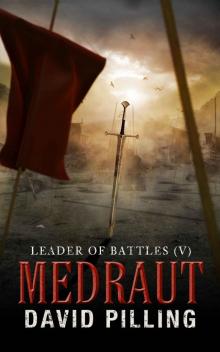 Medraut
Medraut Hardway
Hardway Holy Warrior
Holy Warrior Caesar's Sword: The Complete Campaigns
Caesar's Sword: The Complete Campaigns The Wolf Cub
The Wolf Cub Reiver
Reiver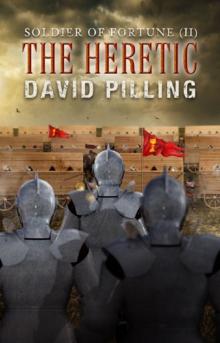 The Heretic
The Heretic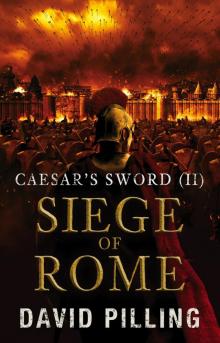 Siege of Rome
Siege of Rome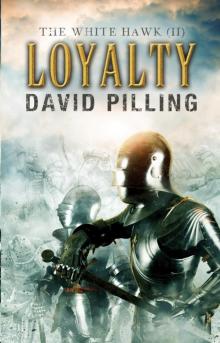 Loyalty
Loyalty The Path of Sorrow
The Path of Sorrow Caesar's Sword (I): The Red Death
Caesar's Sword (I): The Red Death Flame of the West
Flame of the West The Best Weapon
The Best Weapon Sacrifice
Sacrifice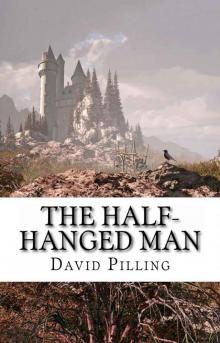 The Half-Hanged Man
The Half-Hanged Man